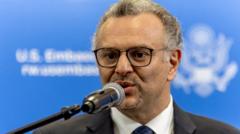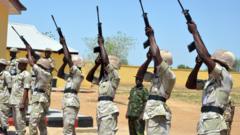Despite the Trump administration's substantial cuts to foreign aid impacting health programs and increasing poverty, US Senior Advisor for Africa Massad Boulos emphasizes Africa's importance to the president, downplaying fears of mission closures and raising dialogues on trade and resource exploitation.
Mixed Signals: Trump's Africa Strategy Amid Aid Cuts

Mixed Signals: Trump's Africa Strategy Amid Aid Cuts
US envoy Massad Boulos asserts Trump's commitment to Africa, despite significant aid reductions that have prompted humanitarian concerns.
US Senior Advisor for Africa, Massad Boulos, has publicly stated that President Donald Trump holds Africa in high regard, even amidst significant foreign aid cuts that have left many vulnerable populations in distress. On his first day in office, Trump initiated a freeze on aid as part of his "America First" approach, raising alarms about critical health programs that serve millions across the continent. While Boulos acknowledges the adverse effects of these cuts, which have jeopardized shipments of life-saving medical supplies, he insists that Trump's commitment to Africa remains steadfast.
Boulos, in a recent appearance on BBC's Newsday, refuted claims that the US intended to shutter its diplomatic missions in Africa, asserting that Trump values the continent and its people. Nonetheless, the ongoing cuts have significant ramifications. The World Health Organization warns that several African nations, including Nigeria and Lesotho, may soon exhaust supplies of HIV medication due to halted US funding. Analysts indicate that almost six million Africans could be thrust into extreme poverty as a direct result of these aid reductions.
Reports of distress also surfaced from South Sudan, where humanitarian organization Save the Children reported tragic deaths linked to reduced medical aid service. In response, Boulos characterized such incidents as unrelated to the aid cuts, emphasizing the administration's focus on transparency and efficiency in spending.
Moreover, Boulos identified substantial US interest in the Democratic Republic of Congo's mineral wealth, particularly in the context of global electric vehicle production. He suggested that US involvement in this sector could potentially foster stability in a region long plagued by conflict. He also urged the Rwandan government to withdraw its support for insurgents in the DRC to facilitate economic partnerships.
When questioned about the US's primary interests in Africa, Boulos declared that he aims to ensure strategic partnerships that benefit both American interests and the African nations involved. Trump's overarching goal, he stated, is to eliminate conflicts around the globe, expressing particular worry regarding the ongoing crisis in Sudan.
Despite Trump's controversial tariff strategies affecting trade relations, Boulos maintained that these measures would not significantly impact most African economies, attributing the tariffs to low trade volumes. Nevertheless, countries like Lesotho have felt the brunt, facing steep tariffs that threaten their textile export industries, crucial for their national income.
In conclusion, while Boulos assures that Africa continues to hold a critical place in Trump's foreign policy, the reality of aid cuts and trade uncertainties raises pressing concerns about the future of US-African relations. As the administration evaluates its stance, the path ahead remains complex and fraught with challenges for both the US and its African partners.

















